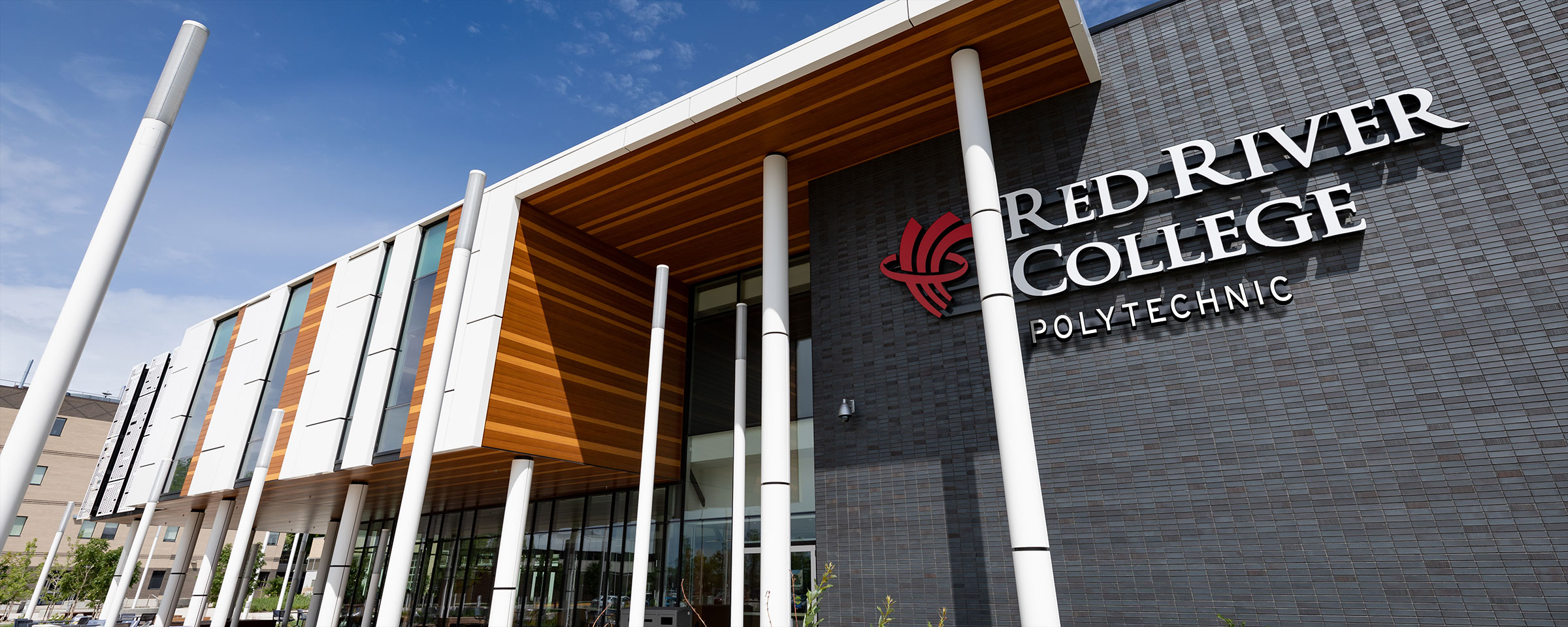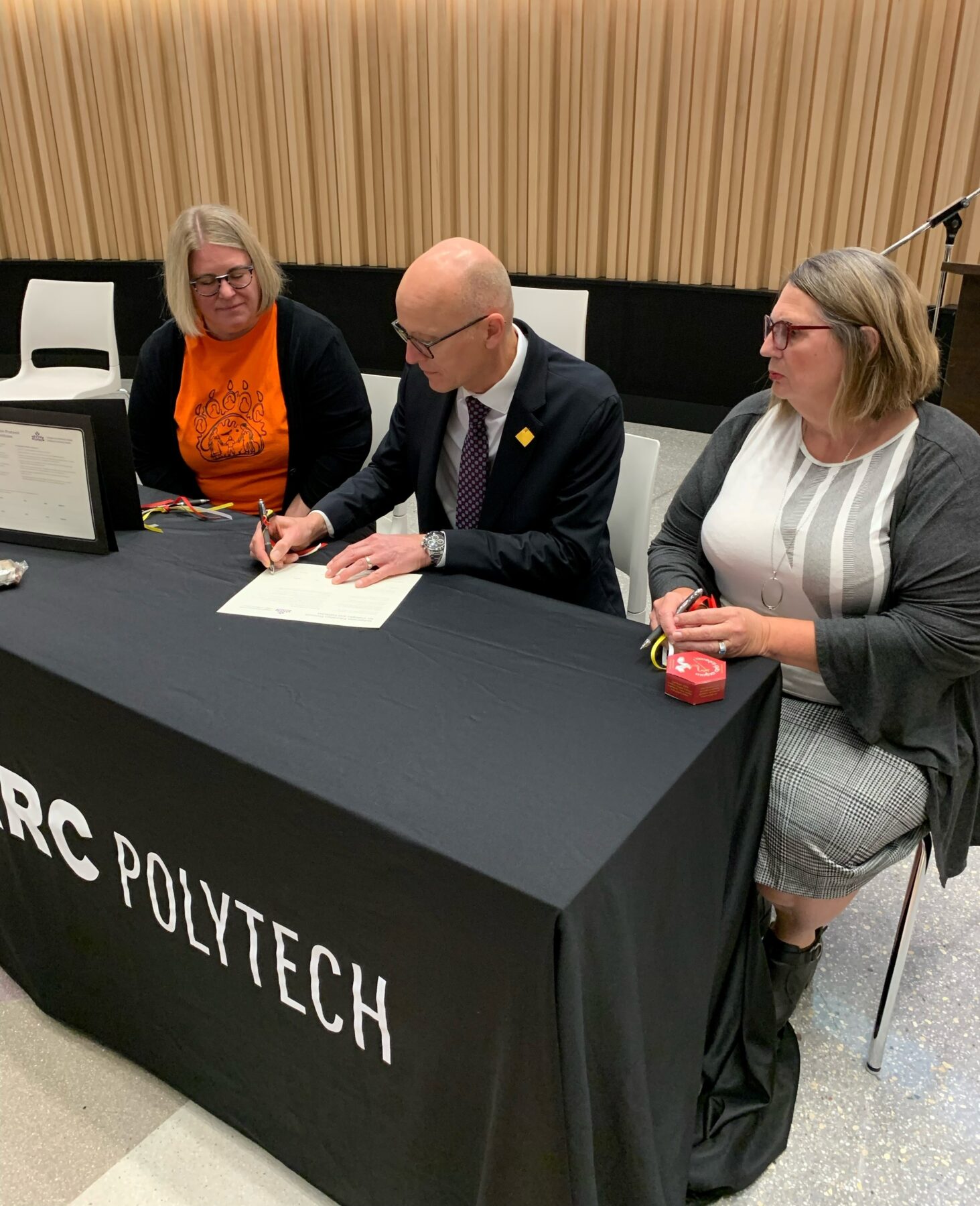RRC Polytech Opens Truth and Reconciliation Week with the Signing of Indigenous Education Protocol
Winnipeg, Manitoba, on original lands of Anishinaabe, Ininiwak, Anishininwak, Dakota, and Dene peoples, and on the Homeland of the Red River Métis Nation — Truth and Reconciliation Week is an opportunity to reflect and honour the victims and survivors of Canada’s Residential School system, ensuring they are never forgotten.
To begin Truth and Reconciliation Week, Red River College Polytechnic announced today that it is joining the members of Colleges and Institutes Canada (CICan) as a signatory of a national Indigenous Education Protocol.
This comprehensive document underscores the importance of structures and approaches required to address Indigenous peoples’ learning needs and support self-determination and socio-economic development of Indigenous communities.
“We have dedicated ourselves to reconciling a broken trust in our education system and recognize that advancing Indigenous achievement requires organizations to listen, embrace new ways of learning and work together to prompt meaningful change,” says Fred Meier, President and CEO at RRC Polytech. “By upholding this agreement, RRC Polytech and its CICan partners will continue to create opportunities to integrate Indigenous knowledge and teaching methods into student and faculty supports, to inform our administrative processes, and to build collaborative partnerships that elevate reconciliation.”
Indigenous Education Protocol signatory institutions agree to:
- Commit to making Indigenous education a priority.
- Ensure governance structures recognize and respect Indigenous peoples.
- Implement intellectual and cultural traditions of Indigenous peoples through curriculum and learning approaches relevant to learners and communities.
- Support students and employees to increase understanding and reciprocity among Indigenous and non-Indigenous peoples.
- Commit to increasing the number of Indigenous employees with ongoing appointments throughout the institution, including Indigenous senior administrators.
- Establish Indigenous-centred holistic services and learning environments for learner success.
- Build relationships and be accountable to Indigenous communities in support of self-determination through education, training and applied research.
Colleges, institutes, and polytechnics are often the primary access point to post-secondary education for First Nations, Inuit and Métis learners. As the main providers of adult education and upskilling programs they are key to breaking down barriers to post-secondary education. This is especially important for Indigenous learners because the percentage of Indigenous men and women aged 25-64 without a high school diploma stands at 26%, more than twice that of non-Indigenous Canadians (11%).
“Education is vital to strengthening Indigenous communities and we are so proud of the work our members do to ensure that their institutions make culturally relevant education, governance, and support services a priority,” says Denise Amyot, President and CEO of Colleges and Institutes Canada. “I am pleased to welcome Red River College Polytechnic as a signatory of our Indigenous Education Protocol. Congratulations.”
The Indigenous Education Protocol aligns closely with the recommendations issued by Canada’s Truth and Reconciliation Commission in 2015 and is supported by many initiatives already underway at the College.
RRC Polytech works together with its Elders-in-Residence, Knowledge Keepers Council, and Director of Truth and Reconciliation to make informed decisions and embed Indigenous teachings and traditions into its programs and culture.
Manitoba’s former Treaty Commissioner, Jamie Wilson, was recently hired to add his visionary leadership and relationship building acumen to the portfolio of Vice-President of Indigenous Strategy, Research, and Business Development.
The location of today’s signing, Manitou a bi Bii daziigae at the College’s Exchange District Campus, includes open spaces that celebrate Mother Earth, technology to accommodate traditional ceremonies, and artwork on walls, ceilings and floors that celebrates Indigenous artists and creates an atmosphere of belonging.
All staff are encouraged to complete the Four Seasons of Reconciliation training modules and a blanket exercise to learn about the true effects of Canada’s colonization. Throughout the year, the College hosts a variety of special ceremonies, presentations, workshops, seasonal solstice and equinox celebrations and concludes each year with an annual Pow Wow honouring Indigenous graduates.
“RRC Polytech is a learning institution, a workplace and a community; post-secondary is where many young people are exposed to life altering thought processes, ideas and new pathways. For me, post-secondary helped shape who I am,” says Carla Kematch, Director of Truth and Reconciliation at RRC Polytech. “Not only is it our responsibility to educate on Truth and Reconciliation, we hold a unique space for transformative learning to occur for the future of our province and to help heal the deep wounds that still impact Indigenous peoples.”
RRC Polytech is committed to Truth and Reconciliation and embedding equity, diversity, and inclusion into everything we do. CICan’s Indigenous Education Protocol will help guide the College on its mission of providing top level post-secondary education while transforming spaces, places and hearts; weaving together two distinct cultures; and improving relationships between Indigenous and non-Indigenous peoples to empower communities and promote a culture of respect and inclusion.
Colleges and Institutes Canada represents 142 of Canada’s publicly funded colleges and institutes. Founded in 1972, the association serves as the national and international voice of Canada’s largest post-secondary education network. Our work is guided by a simple yet ambitious vision: building better futures for peoples and communities. We achieve this by strengthening Canada’s system of publicly supported colleges, institutes, CEGEPs, and polytechnics.










